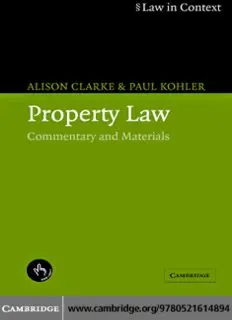
Property Law: Commentary and Materials (Law in Context) PDF
Preview Property Law: Commentary and Materials (Law in Context)
This page intentionally left blank Property Law Thisisaninnovativeexaminationofthelaw’streatmentofproperty.Itlooksatthenature andfunctionofpropertyrightsinresourcesrangingfromlandtogoodsandintangibles, andprovides adetailedanalytical exposition ofthecontent,function andeffect ofthe propertyruleswhichregulateouruseoftheseresources,andthefundamentalprinciples whichunderpinthisstructureofrules.Itdrawsonawiderangeofmaterialsonproperty rightsingeneralandtheEnglishpropertylawsysteminparticular.Thebookincludesthe core legal source materials in property law along with readings from social science literature, legal theory and economics, many of which are not easily accessible to law students. These materials are accompanied by a critical commentary, as well as notes, questionsandsuggestionsforfurtherreading. ALISON CLARKE is Senior Lecturer in Laws at University College London. She has devisedandtaughtinnovativepropertylawcoursesforundergraduatelawstudentsand specialised postgraduate courses in property-related areas in insolvency and maritime law.ShespenttwoyearssecondedtotheLawCommissiontoworkonreformofthelawof mortgagesandformerlypractisedasasolicitorinacommercialpracticespecialisingin land transactions. She has written widely on theoretical aspects of property, with particular emphasis on communal land rights and evolving patterns of land usage, whilstcontinuingtomaintainlinkswithlawinpracticebygivinglecturesandseminars toprofessionallawyersonshipmortgagesandcommercialproperty. PAUL KOHLER splits his time between academe and business. A former Sub-Dean at UCLandHeadofBestPracticeatNabarroNathanson,heiscurrentlyalawlecturerat NewCollege,Oxford,andisChairmanofLLT(alegaleducationprovider).Heworks withsomeoftheleadinglawfirmsintheUKasaknowledgemanagementandchange consultant specializing in the application of new technology to transform working practices. Paul has devised and taught innovative property courses for over a decade andresearchedandwrittenwidelyinthefield. TheLawinContextSeries Editors:WilliamTwining(UniversityCollegeLondon)and ChristopherMcCrudden(LincolnCollege,Oxford) Since 1970 the Law in Context series has been in the forefront of the movement to broadenthestudyoflaw.Ithasbeenavehicleforthepublicationofinnovativescholarly booksthattreatlawandlegalphenomenacriticallyintheirsocial,political,andeconomic contextsfromavarietyofperspectives.Theseriesparticularlyaimstopublishscholarly legalwritingthatbringsfreshperspectivestobearonnewandexistingareasoflawtaught in universities. A contextual approach involves treating legal subjects broadly, using materialsfromothersocialsciences,andfromanyotherdisciplinethathelpstoexplain theoperationinpracticeofthesubjectunderdiscussion.Itishopedthatthisorientation isatoncemorestimulatingandmorerealisticthanthebareexpositionoflegalrules.The seriesincludesoriginalbooksthathaveadifferentemphasisfromtraditionallegaltext- books, while maintaining the same high standards of scholarship. They are written primarilyforundergraduateandgraduatestudentsoflawandofotherdisciplines,but mostalsoappealtoawiderreadership.Inthepast,mostbooksintheserieshavefocused on English law,but recent publications include books on Europeanlaw, globalisation, transnationallegalprocesses,andcomparativelaw. BooksintheSeries Anderson,SchumandTwining:AnalysisofEvidence Ashworth:SentencingandCriminalJustice Barton&Douglas:LawandParenthood Bell:FrenchLegalCultures Bercusson:EuropeanLabourLaw Birkinshaw:EuropeanPublicLaw Birkinshaw:FreedomofInformation:TheLaw,thePracticeandtheIdeal Cane:Atiyah’sAccidents,CompensationandtheLaw Clarke&Kohler:PropertyLaw:CommentaryandMaterials Collins:TheLawofContract Davies:PerspectivesonLabourLaw deSousaSantos:TowardaNewLegalCommonSense Diduck:Law’sFamilies Elworthy&Holder:EnvironmentalProtection:TextandMaterials Fortin:Children’sRightsandtheDevelopingLaw Glover-Thomas:ReconstructingMentalHealthLawandPolicy Gobert&Punch:RethinkingCorporateCrime Harlow&Rawlings:LawandAdministration:TextandMaterials Harris:AnIntroductiontoLaw Harris:RemediesinContractandTort Harvey:SeekingAsylumintheUK:ProblemsandProspects Hervey&McHale:HealthLawandtheEuropeanUnion Lacey&Wells:ReconstructingCriminalLaw Lewis:ChoiceandtheLegalOrder:RisingabovePolitics Likosky:TransnationalLegalProcesses Maughan&Webb:LawyeringSkillsandtheLegalProcess Moffat:TrustsLaw:TextandMaterials Norrie:Crime,ReasonandHistory O’Dair:LegalEthics Oliver:CommonValuesandthePublic–PrivateDivide Oliver&Drewry:TheLawandParliament Picciotto:InternationalBusinessTaxation Reed:InternetLaw:TextandMaterials Richardson:Law,ProcessandCustody Roberts&Palmer:DisputeProcesses:ADRandthePrimaryForms ofDecision-Making Scott&Black:Cranston’sConsumersandtheLaw Seneviratne:Ombudsmen:PublicServicesandAdministrativeJustice Stapleton:ProductLiability Turpin:BritishGovernmentandtheConstitution:Text,CasesandMaterials Twining&Miers:HowtoDoThingswithRules Twining:GlobalisationandLegalTheory Twining:RethinkingEvidence Ward:ACriticalIntroductiontoEuropeanLaw Ward:ShakespeareandLegalImagination Zander:CasesandMaterialsontheEnglishLegalSystem Zander:TheLaw-MakingProcess Property Law Commentary and Materials Alison Clarke and Paul Kohler cambridge university press Cambridge, New York, Melbourne, Madrid, Cape Town, Singapore, São Paulo Cambridge University Press TheEdinburghBuilding,Cambridgecb22ru,UK Published in the United States of America by Cambridge University Press, New York www.cambridge.org Information on this title: www.cambridge.org/9780521614894 ©AlisonClarkeandPaulKohler2005 Thispublicationisincopyright.Subjecttostatutoryexceptionandtotheprovisionof relevantcollectivelicensingagreements,noreproductionofanypartmaytakeplace without the written permission of Cambridge University Press. Firstpublishedinprintformat 2005 isbn-13 978-0-511-13464-7 eBook(EBL) isbn-10 0-511-13464-9 eBook(EBL) isbn-13 978-0-521-61489-4 paperback isbn-10 0-521-61489-9 paperback CambridgeUniversityPresshasnoresponsibilityforthepersistenceoraccuracyofurls forexternalorthird-partyinternetwebsitesreferredtointhispublication,anddoesnot guaranteethatanycontentonsuchwebsitesis,orwillremain,accurateorappropriate. Contents Preface page xvii Acknowledgments xix Tableofcases xxii Tableofstatutes xxxv Tableofstatutoryinstruments xliv Tableoftreaties xlv TableofEClegislation xlvi Part1 Theconceptofproperty 1 1 Propertylaw:theissues 3 1.1 Basicdefinition 3 1.2 Illustrativeexample 3 1.2.1 John 4 1.2.2 DrAandDrBandtheacquisitionandtransmission ofpropertyinterests 13 1.2.3 Thedrugscompany:constraintsontheexerciseof propertyrights 14 2 Whatwemeanby‘property’ 17 2.1 Introduction 17 2.1.1 Propertyasarelationshipandasathing 17 2.1.2 Conceptualising‘things’ 18 2.1.3 Distinguishingpropertyrightsfromotherrights relatingtothings 18 2.1.4 Rightsandotherentitlements:Hohfeld’srightsanalysis 19 2.1.5 Hohfeldiananalysisofdynamicpropertyrelationships 24 2.1.6 Propertyrights,propertyinterestsandownership 26 2.2 Privateproperty,communalproperty,stateproperty andnoproperty 35 2.2.1 Introduction 35 2.2.2 Distinguishingno-property,communalproperty, statepropertyandprivateproperty 36 vii viii Contents 2.3 Economicanalysisofpropertyrights 42 2.3.1 Whateconomicanalysisseekstoachieve 42 2.3.2 Keyconceptsintheeconomicanalysisofproperty rights 45 2.4 Thingsasthingandthingsaswealth 50 2.4.1 Functionsofthings 50 2.4.2 Theideaofafund 51 2.4.3 Thingversuswealth 51 2.4.4 Relatedconceptions 52 3 Justificationsforpropertyrights 59 3.1 Introduction:generalandspecificjustifications 59 3.2 Economicjustificationofpropertyrights 59 3.2.1 Propertyandscarcity 59 3.2.2 Viabilityofsinglepropertysystems 78 3.2.3 Criteriaformeasuringthesuccessofaparticular formofownership 80 3.3 JohnLocke’sjustificationforprivateproperty 81 3.3.1 WhatLockewasattemptingtoestablish 81 3.3.2 Thepoliticalcontext 82 3.3.3 Theproblemofconsent 83 3.3.4 Locke’sjustificationfororiginalacquisition 83 3.3.5 ThenatureofLocke’scommons 84 3.3.6 Whymixinglabourwithathingshouldgiverise toentitlement 84 3.3.7 Thesufficiencyproviso 87 3.3.8 Thespoilationproviso 89 3.3.9 ThetheologicaldimensiontoLocke’stheory 90 3.3.10 PresentrelevanceofLocke’stheory 90 4 Allocatingpropertyrights 107 4.1 Introduction 107 4.2 Thefirstoccupancyrule 108 4.2.1 Intuitiveordering 108 4.2.2 Preservationofpublicorder 109 4.2.3 Simplicity 110 4.2.4 Signalling 110 4.2.5 Thebondbetweenpersonandpossessions 111 4.2.6 Thelibertarianjustification 111 4.2.7 Thecommunitarianobjection 112 4.2.8 Economicefficiency 112 4.3 Newthings 122 4.4 Capture 128
